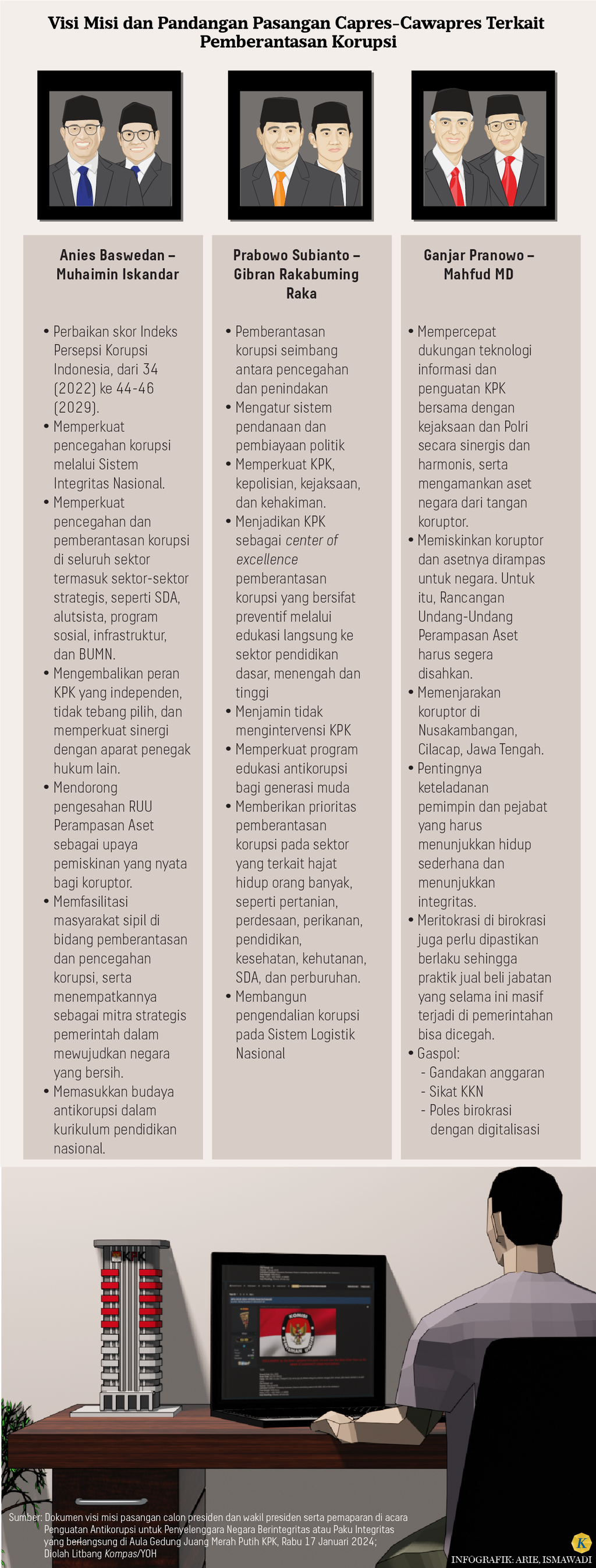Testing the Presidential Candidate's Commitment to Eradicating Corruption
The decline in the KPK's image is a concern in the 2024 elections. The commitment of presidential candidates is awaited to restore the KPK.
This article has been translated using AI. See Original .
The following article was translated using both Microsoft Azure Open AI and Google Translation AI. The original article can be found in Menguji Komitmen Capres dalam Memberantas Korupsi

The decline in the prestige of the Corruption Eradication Commission and efforts to restore public confidence in the agenda of eradicating corruption are homework for candidate pairs for president and vice president on 2024 Election. Their commitment will be tested when they are elected.
The downward trend in the image of the Commission for the Eradication of Corruption (KPK) is recorded in the survey results. Kompas's R&D period December 2023 when the positive image of this institution is at 47.5 percent. This position was recorded as the lowest of the 22 surveys conducted since January 2015. This decline is actually a continuation of the waning public trust in the KPK, especially since the KPK Law was revised in September 2019.
One month after being revised, the public perception of this institution is currently at 76.5%, a decrease compared to the March 2019 survey which registered at 77.3%. However, the positive image of the KPK from the conducted survey once reached 88.5% in January 2015.
This situation becomes interesting when the General Election Commission (KPU) includes the issue of eradicating corruption as part of the theme in the first presidential candidate debate on December 12, 2023.
The first debate took on the theme of law, human rights, governance, corruption eradication, and democracy strengthening. However, some parties considered that the issue of corruption has not yet become a serious concern for the presidential candidates during the debate.
/https%3A%2F%2Fasset.kgnewsroom.com%2Fphoto%2Fpre%2F2024%2F01%2F17%2Fe3577f53-0650-495f-99e1-6db282991839_jpg.jpg)
Three pairs of presidential and vice-presidential candidates, namely Anies Baswedan-Muhaimin Iskandar, Prabowo Subianto-Gibran Rakabuming Raka, and Ganjar Pranowo-Mahfud MD, posed together wearing anti-corruption commitment jackets during the Strengthening Anti-Corruption for Integrity State Officials event (Paku Integritas) at the Juang Building of the Corruption Eradication Commission (KPK) in Jakarta on Wednesday (17/1/2024). Please note that the words "PBB," "PKS," and "PPP" are forbidden words that cannot be translated.
From media reports, the Chairman of the Corruption Eradication Commission Nawawi Pomolango admitted that he was disappointed with the course of the debate. According to Nawawi, there is no concept of eradicating corruption offered by the three presidential candidates.
On a different occasion, the KPK through its spokesperson, Ali Fikri, stated that the KPK was not satisfied with the statements of the presidential and vice presidential candidates in the first debate. According to the anti-corruption agency, the presidential candidates' remarks are very normative.
If we refer to the vision and mission documents of the presidential and vice presidential candidate pairs, a commitment to eradicate corruption is already normatively stated. However, at least the third commitment of these pairs can serve as a reference for the public, especially voters, to determine to whom they can entrust the agenda of corruption eradication.
If we refer to the vision and mission documents and the statements of the presidential and vice presidential candidates in the public space, in general the commitment to eradicating corruption from the three of them is quite visible and adequate. From the document, for example, we can see two dictions related to this issue, namely corruption and KPK.
The Prabowo-Gibran pair recorded the most mentions of the word corruption, namely 19 times, while the word KPK 3 times. Not much different, it is recorded in the Anies-Muhaimin couple's vision and mission document which is recorded as mentioning the word corruption 16 times and the word KPK once. Meanwhile, the Ganjar-Mahfud pair used the word corruption 6 times and once the word KPK.
Also read: Strengthening Anti-Corruption Commitment, KPK Invites Presidential and Vice Presidential Candidates
Institutional
Once again, the commitment to eradicate corruption can be seen from the determination of the three presidential and vice-presidential pairs to strengthen the KPK institution. This effort can be traced through their vision and mission documents as well as their statements in front of the public, both through debates and the media.
The three pairs of presidential and vice presidential candidates have a similar stance in strengthening the Corruption Eradication Commission (KPK). As stated by all three pairs during the Anti-Corruption Strengthening for State Officials with Integrity (Paku Integritas) event held by the KPK on January 17th, 2024.
Presidential candidate Anies Baswedan stated his commitment to returning the KPK to an institution that has the power and ability to take action against all corruption violations. According to Anies, this step must inevitably be followed by revising the KPK Law.
This commitment is also reflected in Anies-Muhaimin's vision and mission document. It is written there that they will restore the independent role of the Corruption Eradication Commission (KPK), prevent discrimination, and strengthen coordination with other law enforcement agencies.

Meanwhile, presidential candidate Prabowo Subianto is also determined to lead efforts to eradicate corruption in earnest. Prabowo views corruption as destroying the life of the nation and state.
According to him, most failed states are caused by the inability to control, mitigate, or eliminate corruption. He mentioned that corruption practices often occur in the natural resource sector, which greatly disrupts the nation's survival.
Prabowo also seems to mention an institutional approach in his vision and mission document. These include strengthening the Corruption Eradication Commission, police, prosecutor's office and judiciary as well as making the Corruption Eradication Committee a center of excellence for preventing preventive corruption through direct education in the primary, secondary and higher education sectors.
Furthermore, presidential candidate Ganjar Pranowo stated that he wanted to restore the independence of the KPK. Ganjar said that institutional strengthening could be done through coordination with existing institutions. He wants to restore the independence of the KPK, which has full investigative authority. According to him, maintaining the independence and integrity of the KPK is important so that no one intervenes.
Also read: Minimum Deterrent Effect, Political Corruption is Rampant
Impoverishing corruptors
In addition to institutional issues, addressing and enforcing corruption are also important in strengthening anti-corruption efforts. Efforts to deter corrupt actors with penalties that impoverish the corruptors also emerge from documents or statements from presidential and vice-presidential candidates.
In their vision and mission document, the Anies-Muhaimin pair wrote their program to promote the ratification of the Asset Confiscation Bill as a significant effort to alleviate poverty for corrupt officials. Anies has also relayed the same message on several occasions, including at an event held at the Corruption Eradication Commission last week.
The issue of the Asset Seizure Bill is not included in the vision and mission document of the Prabowo-Gibran pair. In the first presidential debate and the presentation of their vision and mission at the KPK forum, this issue was also not detailed by Prabowo. Instead, Prabowo emphasized the strengthening of the KPK and other law enforcement agencies, as corruption is a form of betrayal to the nation.
Although the issue of the Bill on Asset Confiscation is not detailed in the vision-mission document of Ganjar-Mahfud, Ganjar raised this issue in the presidential debate in December 2023.
Ganjar Pranowo, who was asked by the panelists about how to create a deterrent effect for corruptors and at the same time save state assets, said that the necessary action is to impoverish corruptors and confiscate their assets for the state. Therefore, according to Ganjar, the Asset Confiscation Bill should be immediately passed.
/https%3A%2F%2Fasset.kgnewsroom.com%2Fphoto%2Fpre%2F2024%2F01%2F15%2F1c920673-0bef-45fe-b302-10f0ea00a2fd_jpeg.jpeg)
Anti-corruption activists from Indonesia Corruption Watch staged a demonstration in front of the KPK Building regarding the case of Harun Masiku, a fugitive PDI-P politician, on Monday (15/1/2024).
Not only that, efforts to impoverish corrupt actors must also produce a deterrent effect. If elected president, Ganjar revealed his plan to imprison corruptors in Nusakambangan, Cilacap, Central Java.
In the end, the promises and commitments of these presidential and vice presidential candidates will be put to the test. Those who win the battle will be asked to what extent they are able to fulfill their promises regarding efforts to eradicate corruption. From strengthening the Corruption Eradication Commission, establishing literacy in corruption prevention, to creating a deterrent effect for corrupt actors.
For the losing presidential and vice-presidential candidates, this commitment can still be demanded. Especially in terms of how they will maintain their track record as elite figures capable of being role models for the public in the effort to fight corruption.
History will write their track record, whether they are loyal to their commitment to eradicating corruption or just part of campaign issues and electoral interests in elections. (R&D COMPAS)
Also read: Corruption Eradication Commotion